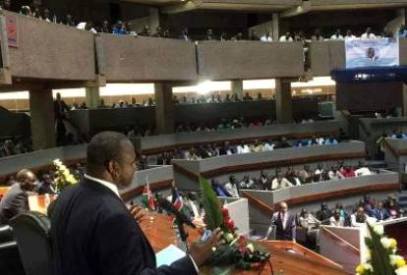Machar calls on South Sudanese to embrace peace
March 26, 2016 (NAIROBI) – Top armed opposition leader, Riek Machar, has called on the people of South Sudan to stop what he said was widespread “hate speech” being circulated on social media on daily basis, urging the people of the world’s youngest nation to turn their internet interactions into peace making for the good of the country.

“Internet warriors, please stop hate speech, embrace peace and reconcile,” Machar told thousands of people who attended the briefing.
The 6-hour long briefing, which took place at KICC, was attended by South Sudanese from all walks of life irrespective of their political affiliations, including supporters of President Salva Kiir’s government.
The opposition leader told members of the audience who fight in the internet not to behave like the government in Juba which has turned the state-owned South Sudan Television (SSTV) into a hate speech medium, and in particular mentioned Brigadier General Malaak Ayuen who heads information department in the army as one of the government’s hate speech preachers on the national TV.
He said since a peace agreement has been signed, people should begin to have peace in their minds and preach reconciliation rather than hatred.
“This is the reason I have wanted to meet President Salva Kiir so that we agree on a message which both the government and the opposition faction should constantly be giving to the people. It shouldn’t be such conflicting messages of hatred on one hand and peace and reconciliation on the other,” Machar emphasized.
On governance system, Machar said the opposition faction of the Sudan Peoples’ Liberation Movement (SPLM-IO) is for change and will champion federalism as the system of governance in South Sudan.
Federalism, he argued, has been a popular demand of the people of South Sudan for several decades, adding that its implementation will address a lot of issues of social diversity, political collective decision-making processes as well as faster services delivery and development.
He said SPLM-IO has proposed 21 states based on the former colonial districts with known boundaries.
Machar criticized the 2 October 2015 announced 28 states which President Kiir unilaterally decreed into being despite the president’s earlier rejection of creation of more states during the two years of peace negotiations in the Ethiopian capital, Addis Ababa.
He wondered why the government waited until the peace agreement was signed based on the existing 10 states and couldn’t come up with their counter-proposal of 28 states if Juba liked the idea but was only against the SPLM-IO’s proposed 21 federal states.
The top opposition leader also criticized the 28 states proposed arrangement, saying it did not yet amount to federalism but remains decentralization.
Federalism, he said, is a constitutional arrangement of devolving powers to the lower units of government such as states and counties including fiscal arrangements. Decentralization on the other hand, he said, is a piece meal and the temporarily devolved powers to the states can be taken back by the central government any time.
The issues, he told the audience, will be tackled once a transitional unity government is formed in Juba.
Machar however said he believed the 28 states have no chance of survival, explaining that the parties in unity government may agree on a different number of states or revert to the 10 states as stipulated in the peace deal.
On preparations for his return to the national capital, Juba, Machar said this will “happen soon” once his forces are in the capital.
While his police top generals have arrived in Juba, Machar said he was still waiting for the 1,370 units of police and military personnel to be transported to Juba, adding the forces could be transported to on Sunday.
Once the forces arrive in Juba, he said it would take only days for the top leadership to arrive in the capital from his General Headquarters of Pagak in Upper Nile state.
He said some of the outstanding issues and ceasefire violations by the government may not be resolved until the transitional government is formed, adding “then we will see whether the unity government will continue to wage war in Equatoria and Bahr el Ghazal regions.”
He said it was unfortunate that after signing the peace agreement on 26 August 2015, President Kiir said he would still continue war in Equatoria region to hunt their fighters like “rats.”
The government has therefore refused to recognize opposition fighters in Equatoria and Bahr el Ghazal regions, denying them the opportunity to assemble in cantonment areas in contravention of the security arrangements between the government and the SPLM-IO.
Given the signs that President Kiir’s government is not ready to make changes through reforms provided in the peace agreement and has continued with reluctance to reunify the factions of the SPLM, Machar said he doesn’t expect smooth running of the would-be transitional unity government composed of rival factions.
The opposition leader who interacted with the South Sudanese in Nairobi through question and answer discussions however appealed to them to embrace peace and reconcile among themselves.
He also called on youth to join the SPLM-IO, saying his party has a plan to transit power to youth leaders.
He also revealed that the opposition faction has formed a Veterans League for those who will be retired in the future of which he is a member.
(ST)
